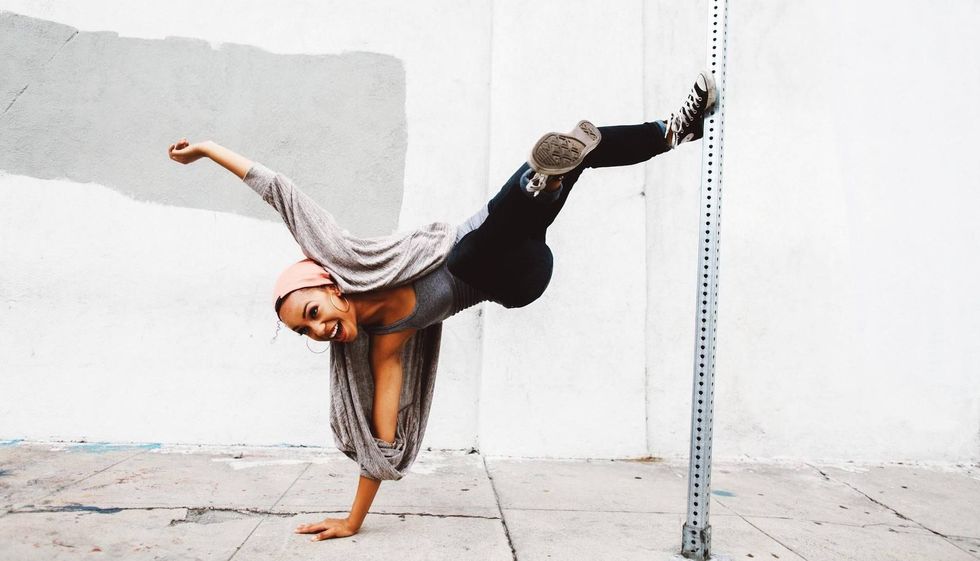Afropreneurs: These Fly Beanies & Hats Help Protect Your Hair In Style
Meet Grace Eleyae—the force behind the hair protecting Satin-Lines Caps who wants to empower women of color to look and feel beautiful.

From bonnets to durags, Grace Eleyae tried almost every hair accessory to preserve the moisture in her fine hair. Although satin scarves did the trick at night, she didn’t feel comfortable rocking the look while running errands around town. Struggling to find a functional and fashionable solution, Eleyae launched Satin-Lined Caps in 2014 to empower women to conquer the world while looking good.
Most black women are well acquainted with the nighttime ritual of covering one’s hair. Because cotton pillowcases strip moisture from hair, women of curly textures, particularly black women, have used satin for decades to help reduce breakage. “Because it sucks out that moisture, it causes friction,” Eleyae says, “which causes tangles and breakage as we try to comb it out.”
But day-to-day activities in dry climates can also be hard on hair. After a long trip road trip across Kenya, Eleyae noticed hair breakage after long days traveling in the heat. Frustrated with the lack of stylish protective daytime accessories, she soon broke out her sewing machine to create a prototype of her signature satin-lined cap.
Every Saturday is best spent in your favorite Satin-Lined Cap by #GraceEleyae || #geSlap #geSlaps
A photo posted by SLAPS by Grace Eleyae (@satinlinedcaps) on
“It was all trial and error,” she tells OkayAfrica. “When I jumped in, I didn’t know what I was doing. At the time, I was working towards a fashion design certificate, so I knew how to sew, sketch, and make patterns.” After cultivating a network of reliable vendors, Eleyae’s vision slowly took shape.
Satin-Lined Caps (affectionately known as SLAPs) are made with a satin interior lining to keep hair moisturized from day to night. They also feature an elastic band to ensure the cap stays in place, and a cotton-knit exterior similar to a beanie, for fashion and comfort. The caps fit a variety of hairstyles from a short crop to waist-length box braids. Eleyae also sells pillowcases, scrunchies, and hats ranging from $7.99 to $45.99.
A photo posted by SLAPS by Grace Eleyae (@satinlinedcaps) on
Although scarves and bonnets are most commonly associated with black women, the SLAP customer base is remarkably diverse. “We’ve seen customers from all different ethnicities and hair textures,” Eleyae says. “In Northern Europe, where the women often have very fine hair, and it’s quite cold and dry, many women will constantly find strands on their pillowcases. The difference is that African-American women see a scarf or the SLAP and immediately understand it; however, women of other ethnicities need to be educated about satin.”
As a much more stylish option than the bulky bonnets found in most beauty store aisles, SLAPs are suitable for everywhere from the grocery store to the gym. Eleyae, who wears her hair natural, favors styling her hair at night and wearing her SLAP while working out to preserve the shape of her twist-out.
Each cap is branded with the founder’s own name—an homage to other female entrepreneurs like Tory Burch and Vera Wang who make products for women. Because Satin-Lined Caps is rooted in Eleyae’s own experience as a woman of color, the company has succeeded in making much-needed products in a traditionally underserved market. As the beauty and apparel industries continue to struggle to cater to women of color, Satin-Lined Caps joins the new spate of brands like Nubian Skin, that are expanding a range of products that empower every woman to look and feel beautiful.
Akinyi Ochieng is a writer and researcher of Gambian and Kenyan origin who studies the culture and politics of emerging markets. You can follow her on Twitter @kikiochieng and her blog.

